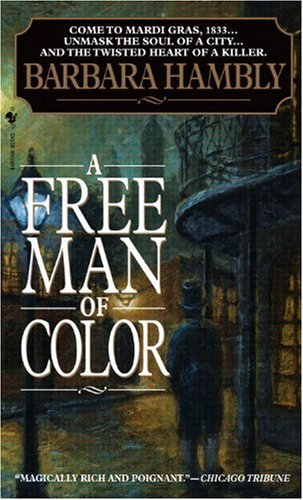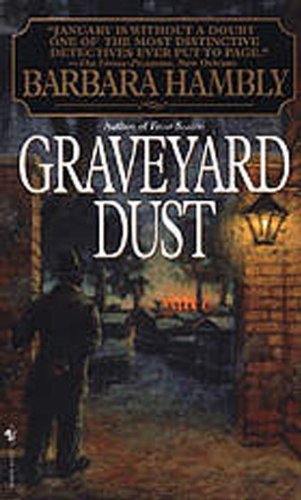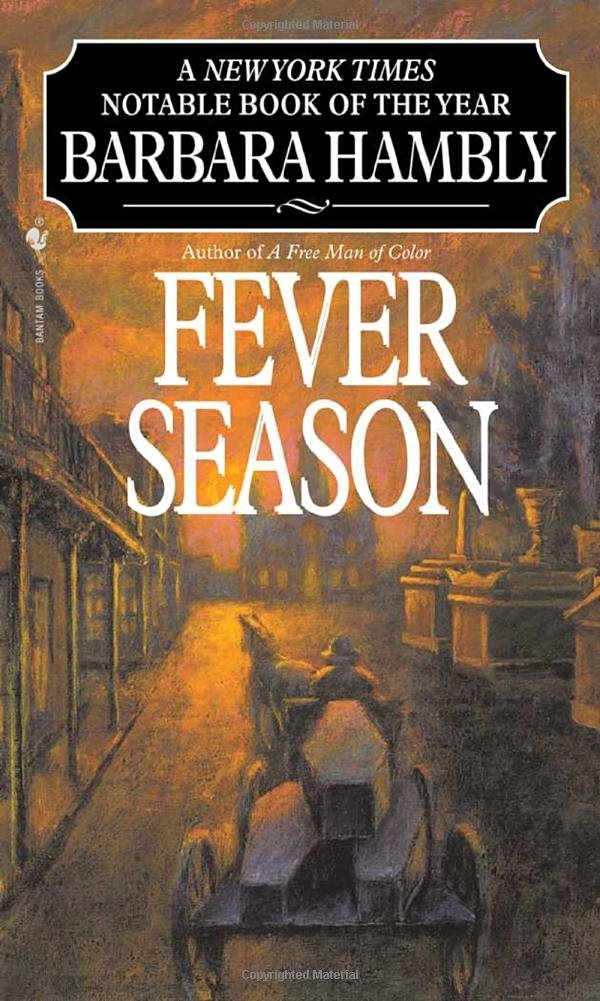Not a book review: Racism in America then and now
December 30, 2014
 I recently finished reading the eighth book in Barbara Hambly's compelling historical murder mystery series about a free man of color set in 1830s New Orleans shortly after the Louisiana purchased changed that city forever.
I recently finished reading the eighth book in Barbara Hambly's compelling historical murder mystery series about a free man of color set in 1830s New Orleans shortly after the Louisiana purchased changed that city forever.
Benjamin January is the son of an African man and a half white woman. He was given his freedom, his name, and his education by the white Creole, St.-Denis Janvier, who purchased Benjamin's mother to make her his mistress, a relationship known in the "custom of the country" as placée/protector.
Highly educated, Benjamin speaks half a dozen languages, trained as a surgeon in Paris, and is an accomplished pianist. But he's also six-foot three and muscular, with skin dark as his father's. As a result, despite his accomplishments, every white man, especially Americans, see him as money on the hoof. They resent the fact they can not legally sell him as a field hand for more than $1,000. Many are offended at his command of their language, expecting him to speak in a slave's unschooled pidgeon.
 Written from Benjamin's point of view, the books give an educated and intelligent man's interpretation of racism and slavery as it applies to himself, his family, his friends, and people he meets. Unable to work as a surgeon because of his race, Benjamin struggles to support himself as a musician and piano teacher. Because of his race, he is limited to where he can play and who he can teach. And he always contends with his inability to legally defend himself if white men choose to beat him for the money in his pocket or even his boots, the threat that one will kidnap him and try to sell him as a slave, the prohibition against looking a white man in the eye, the necessity of abasing himself in the presence of unschooled, unwashed, louts just because their skin is "white."
Written from Benjamin's point of view, the books give an educated and intelligent man's interpretation of racism and slavery as it applies to himself, his family, his friends, and people he meets. Unable to work as a surgeon because of his race, Benjamin struggles to support himself as a musician and piano teacher. Because of his race, he is limited to where he can play and who he can teach. And he always contends with his inability to legally defend himself if white men choose to beat him for the money in his pocket or even his boots, the threat that one will kidnap him and try to sell him as a slave, the prohibition against looking a white man in the eye, the necessity of abasing himself in the presence of unschooled, unwashed, louts just because their skin is "white."
Although the perspective is similar to that in the book Twelve Years a Slave, the Benjamin January stories provide more entertainment. He invariably must investigate a murder when the blankittes (whites) either falsely accuse a black man (too often Monsieur Janvier himself) of the crime, don't care about the victim because they're black, or just can't figure out whodunit. To solve the mystery, Benjamin often must disguise himself as a slave to gain the access he needs to white spaces and the confidence of other slaves.
Hambly studied history at the University of California, earning a masters degree in Medieval History. Her research, knowledge, and comprehension of the past flavor the Benjamin January series in which the Historic New Orleans Collection is always cited in the acknowledgements. She writes in period, many of her characters plucked from history, using the language of the times as it would have been used then by whites and blacks.
 That language, now considered offensive, can be jarring, and for anyone who has never had to check their white privilege, the books can be an eye opener. But, what I find difficult to accept is how little the world has changed in the almost two hundred years since the books' setting.
That language, now considered offensive, can be jarring, and for anyone who has never had to check their white privilege, the books can be an eye opener. But, what I find difficult to accept is how little the world has changed in the almost two hundred years since the books' setting.
Now, as then:
- It's still all too easy for a black man to lose his freedom because of a white man's lies.
- Black men are still killed for talking back to a white man or touching a white woman, the presumption always that she would never have consented to or asked for that touch.
- Blacks are prevented from making enough to feed their families while white men get rich off their labor.
- Black adult males are still called "boy" by whites.
- Blacks are prevented from voting, not believed when they testify in court (if their testimony is even allowed), and are routinely excluded from serving on juries.
- And still too many people can't see past the pigment of someone's skin, still consider anyone of color less than human.
 Hundreds of thousands died in the Civil War, thousands were murdered during Jim Crow and the Civil Rights Movement, and still black men -- often unarmed, many innocent, some only guilty of crimes that a white would merely receive a ticket for -- are killed every day by whites. And too often, those whites face absolutely no penalties for lynching men and women by claiming they believed they were in danger, even when that claim is absolutely outrageously
unbelievable.
Hundreds of thousands died in the Civil War, thousands were murdered during Jim Crow and the Civil Rights Movement, and still black men -- often unarmed, many innocent, some only guilty of crimes that a white would merely receive a ticket for -- are killed every day by whites. And too often, those whites face absolutely no penalties for lynching men and women by claiming they believed they were in danger, even when that claim is absolutely outrageously
unbelievable.
In the United States the concept of a black man playing a super hero or a secret agent is vilified by the right wing nut jobs. Every action of the first African-American president is reviled even when they duplicate those of white men who were praised for doing exactly the same thing. And dark skinned men are killed daily by cops without any justification. And yet, there are still people who try to stop conversations about racism because they claim it no longer exists.
They couldn't be more wrong.